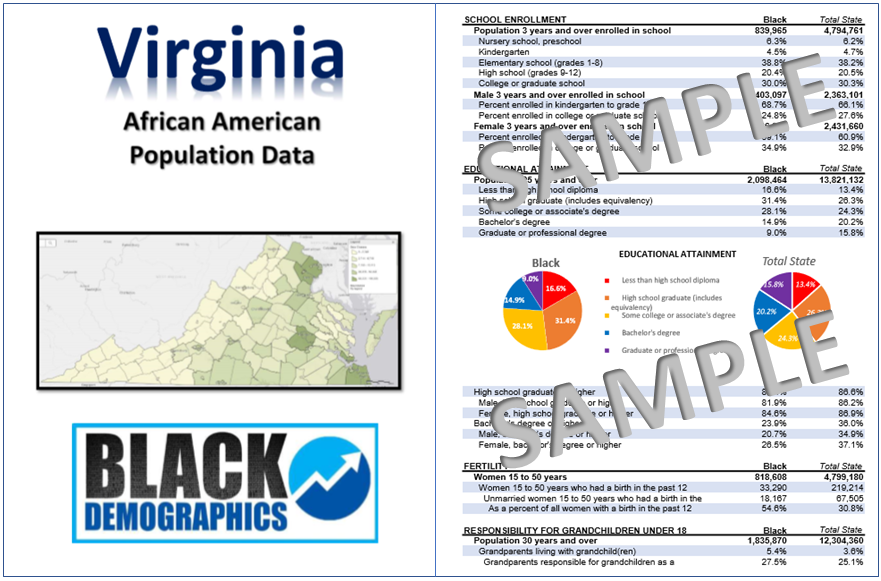Virginia
According to 2020 census data, the Black/African American alone population in Virginia was around 1,607,581, which accounts for approximately 18.9% of the state’s total or 1,799,960 (Black in combination with one or more races) 21% of the population.
| State Data | Black Alone | Total State |
| Population (ACS estimate) | 1,607,581 | 8,642,274 |
| Median household income | $55,345 | $80,963 |
| Bachelor’s degree or higher | 27.6% | 41.8% |
| Family poverty rate | 13.2% | 6.9% |
| Percentage households Married-couple families | 30.5% | 48.9% |
| Homeowner rate | 48.4% | 67.6% |
Source: U.S. Census Bureau, 2021 American Community Survey 1-Year Estimates
GROWTH
Between 1990 and 2020, the Black population in Virginia experienced steady growth, increasing from approximately 1.2 million to over 1.6 million. This growth has been driven by both natural increase and in-migration from other states. As the African American population continues to grow, it has contributed to the political, economic, and cultural landscape of Virginia.
A substantial proportion of Virginia’s African American population resides in the metropolitan areas of Richmond, Hampton Roads, and Northern Virginia. Other urban areas, such as Roanoke, Charlottesville, and Lynchburg, also host significant Black populations. Additionally, there are numerous Black residents living in smaller cities, towns, and rural areas across the state.
Virginia has experienced a reversal of the Great Migration trend, with a significant number of African Americans returning to the state from the North and the West. This phenomenon, known as the “New Great Migration” or the “Reverse Great Migration,” has led to a resurgence of Black communities in the state, particularly in urban areas like Richmond and Hampton Roads. This return migration has been fueled by factors such as job opportunities, affordable housing, and cultural connections to the region.
INDUSTRIES AND WORKFORCE
Historically, Black people in Virginia were employed in various industries, including agriculture, manufacturing, and transportation. Over time, the African American workforce diversified, finding employment in fields such as education, healthcare, and government.
In the present day, African Americans in Virginia work across a range of industries, including technology, healthcare, education, finance, and entertainment. There has been a noticeable increase in Black entrepreneurship, with many small businesses owned and operated by African Americans contributing significantly to Virginia’s economy.
HISTORY
The presence of African Americans in Virginia dates back to 1619 when the first enslaved Africans were brought to the region by the British. By the end of the 18th century, the Black population in Virginia had grown significantly, with enslaved people comprising approximately 40% of the state’s total population.
Following the Civil War and the subsequent emancipation of enslaved people, Virginia’s Black population continued to grow. Many African Americans remained in the state to work as sharecroppers or tenant farmers. During the Great Migration in the early 20th century, a large number of Black residents left the South, including Virginia, in search of better opportunities in the industrial North. However, Virginia’s Black population still experienced growth during this time, reaching approximately 1.2 million by 1990.
As the African American population in Virginia has grown and diversified, it has contributed significantly to the state’s political, economic, and cultural landscape. African American leaders and activists have made substantial strides in local and state politics, while the state’s entertainment, music, and arts scenes have been heavily influenced by the contributions of Black artists and creatives.
Virginia has been home to influential Black figures such as Douglas Wilder, the first African American to be elected governor of a U.S. state, and Arthur Ashe, a legendary tennis player and civil rights activist. Additionally, the cities of Richmond, Norfolk, and Newport News have emerged as major centers for Black entrepreneurship, entertainment, and arts, with thriving creative scenes that have produced influential artists and contributed to the development of various genres, such as jazz, blues, and hip-hop.
Get the Complete Virginia African American Population Report

